Tinariwen | ||
| Allmusic Biography : Tinariwen is a Tuareg group that performs a guitar-centric branch of Malian music that, to the untrained ear, is reminiscent of Ali Farka Tourés, but is far more rock-oriented and percussive. All of the bands musicians originate from the southern Sahara; the groups name, meaning "empty places," is a reflection of their land of origin. The band formed in the rebel camps of Colonel Gaddafi, as each of the musicians had been forced from their nomadic lifestyle into involuntary military service. Surrounded by a displaced nation of their peers, Tinariwen forged a new style of music, trading their traditional lutes and shepherds flutes for electric guitars and drums. The style that resulted was dubbed "Tishoumaren," or "the music of the unemployed." Their music addresses issues such as political awakening, problems of exile, repression of their people, and demands of sovereignty. In a region with no postal or telephone system, their tapes soon became a grassroots voice of rebellion and a rallying point for the disenfranchised nation. Though outlawed in Algeria and Mali, 2001s The Radio Tisdas Sessions and 2004s Amassakoul are available to Western audiences. In 2006, they recorded their third album, Aman Iman: Water Is Life, released internationally in 2007 by Harmonia Mundis World Village imprint. The album was produced by Justin Adams, and featured the voice and guitar of founding member Mohammed Ag Itlale. Tinariwen toured the world for the first time in its wake. They followed the album with Imidiwan: Companions, a two-disc set containing one disc of music and a DVD documentary about Tinariwens history. This was once again followed by a world tour that included numerous festival appearances in the United States and Europe. Tinariwen signed to Americas Anti imprint in 2010. The label encouraged them to experiment. The end result was Tassili, issued in 2011, in which the band recorded a completely acoustic set in a protected region of the southeastern Algerian desert. The tapes were flown to America where guitarist Nels Cline overdubbed electric guitars and New Orleans famed Dirty Dozen Brass Band added horns, making Tassili a truly international collaboration. The album won a Grammy. The bandmembers were forced to flee Mali due to political and social unrest, and recorded their follow-up, Emmaar, at a studio in Joshua Tree National Park in the United States. It was released in February of 2014. Despite ongoing political upheaval, the band reconvened in 2016 after touring behind Emmaar, to record their sixth studio album, Elwan. | ||
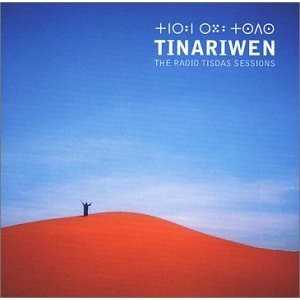 | Album: 1 of 9 Title: The Radio Tisdas Sessions Released: 2001-11-13 Tracks: 10 Duration: 52:47 Scroll: Up Down Top Bottom 25% 50% 75% Spotify Allmusic AlbumCover | 1 Le Chant Des Fauves (07:32) 2 Nar Djenetbouba (04:44) 3 Imidiwaren (06:26) 4 Zin Es Gourmeden (05:19) 5 Afours Afours (05:24) 6 Tessalit (03:56) 7 Khedou Khedou (06:10) 8 Mataraden Anexan (05:45) 9 Bismillah (04:20) 10 Tin-Essako (live) (03:11) |
| The Radio Tisdas Sessions : Allmusic album Review : This is the real desert blues, played by Tuareg tribesmen who live it every day, making their home on the edge of the Sahara desert in Mali. Born in Libyan refugee camps after severe drought blighted the region, its authentic, spare, and haunting, its rhythms echoing the miles of space and the languid pace of their desert surroundings. Played mostly on guitars -- there are six guitarists in the band -- with vocals, some female backing vocals, and touches of percussion, and recorded at Radio Tisdas studios (hence the title) in Kidal, capital of the stark Iforas region, with the facility only available between 7 p.m. and midnight because those were the only hours the electricity was on. This can also be a celebration, as on "Zin Es Gourmeden," where the voices come together over heavily reverbed guitar that would have delighted Jimi Hendrix. These tribesmen might be considered primitive by Western standards, but their music is anything but. The guitar playing might not include flashy solos, but its as deep as anything to come out of the Delta and as electrifying as Chicago -- just hear the opening to "Afours Afours." The final cut, "Tin-Essako," recorded live at Malis Festival of the Desert in January 2001, epitomizes their raw sound, with the guitar offering backing to the voices as well as an elaborate riff, the voices intertwining over clattering percussion. Its brief, but still glorious, a transport to another world that touches ours through its use of the blues progressions (admittedly mostly monochordal) and pentatonic scale. Familiar and yet so distant, this album opens a window on desert life. | ||
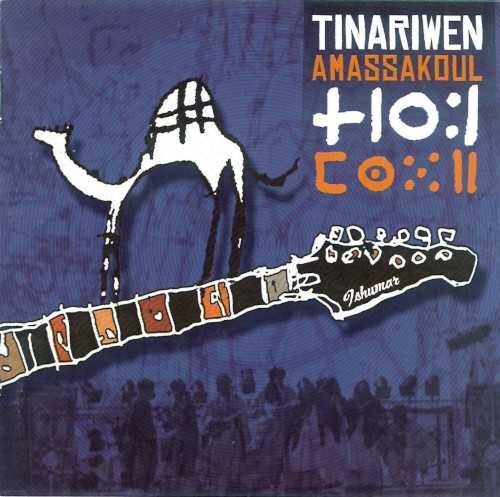 | Album: 2 of 9 Title: Amassakoul Released: 2003 Tracks: 11 Duration: 45:55 Scroll: Up Down Top Bottom 25% 50% 75% Spotify Allmusic Wikipedia AlbumCover | 1 Amassakoul n Ténéré (03:24) 2 Oualahila ar Tesninam (03:47) 3 Chatma (05:36) 4 Arawan (04:06) 5 Chet Boghassa (03:52) 6 Amidinin (02:51) 7 Ténéré Daféo Nikchan (04:51) 8 Aldhechen Manin (03:54) 9 Alkhar Dessouf (04:55) 10 Eh Massina Sintadoben (04:29) 11 Assoul (04:06) |
| Amassakoul : Allmusic album Review : Tinariwen strip rock down to its basic building blocks of rhythm, guitars, and voice. On their second CD there are no fancy studio tricks or multiple overdubs. They stick to what theyve shown they do well -- keep the music raw and emotional. While there are similarities to the desert blues of Mali, these Tuareg nomads from the Western Sahara are as much as rock band as the Stones at their best, capable of conjuring up magic with a guitar riff or lick. Oftentimes, the music has the same bluesy, undulating, hypnotic rhythm of a camel crossing the sand, as on "Aldhechen Manin." But they can also crank the amps and unleash something to tingle the spine and feet, which they do on "Oualahila Ar Tesninam," as frantic and primal a piece of rock & roll as youre likely to find. Theres even a touch of rap on "Arawan." But theres a complexity in their basic approach, the interlocking layers of electric guitars and the plaintive, defiant voices. To listen to Tinariwen is to believe once more in rock and its power. This is angry and passionate; its dangerous music in the very best sense. Western bands might have forgotten how to rock as if their lives depended on it; Tinariwen can teach them. | ||
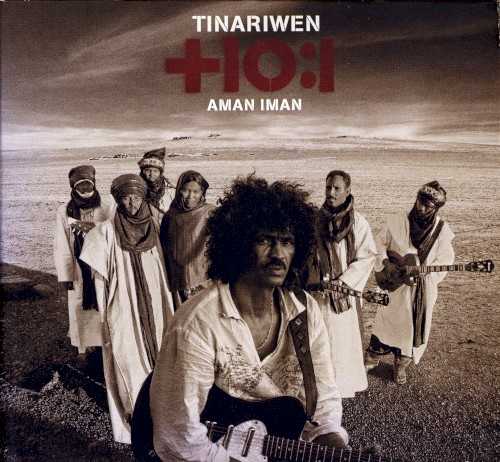 | Album: 3 of 9 Title: Aman Iman: Water Is Life Released: 2006 Tracks: 12 Duration: 54:16 Scroll: Up Down Top Bottom 25% 50% 75% Spotify Allmusic Wikipedia AlbumCover | 1 Cler Achel (04:27) 2 Mano Dayak (05:43) 3 Matadjem Yinmixan (05:45) 4 Ahimana (04:58) 5 Soixante trois (04:13) 6 Toumast (04:26) 7 Imidiwan Winakalin (04:27) 8 Awa Didjen (04:14) 9 Ikyadarh Dim (03:37) 10 Tamatant Tilay (03:21) 11 Assouf (03:58) 12 Izarharh Ténéré (05:02) |
| Aman Iman: Water Is Life : Allmusic album Review : Hand it to Tinariwen. Like the nomads they are, they dont stand still musically. On their third album (the title translates as Water Is Life), they keep the root intact, the desert blues still at the heart of all they do, but this builds upon what they achieved on their superb sophomore disc, happily restless and unafraid of walking down new paths. However, although theyre rightly lauded for their widescreen blues sound, what emerges most here is something they hinted at on the last record -- theyre a remarkable rock & roll band, too. The guitars, locked together in rhythm and lead, create a glorious syncopated noise that puts most rockers to shame. But theres a wonderful looseness to the sound (kudos to producer Justin Adams), in part due to the fact that these tracks were all recorded over just two weeks, a tiny time frame by todays standards. Recorded in the Malian capital of Bamako, these songs arrive with dust on their boots and a little thirsty. The studio touches are subtle, a little on the effects here and there, but never detract from the music -- which even features old member Mohammed Ag Itlale, whose voice and guitar can be heard on several tracks. | ||
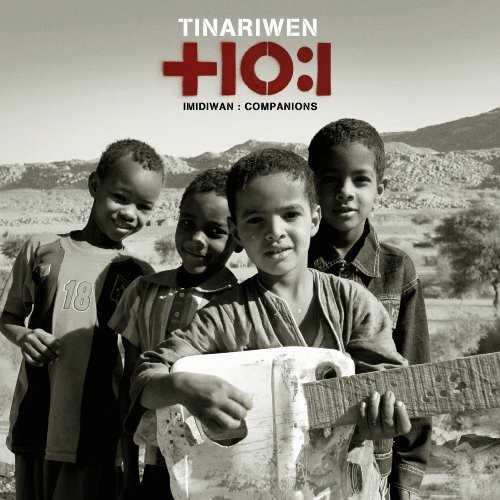 | Album: 4 of 9 Title: Imidiwan: Companions Released: 2009-06-29 Tracks: 13 Duration: 1:02:40 Scroll: Up Down Top Bottom 25% 50% 75% Spotify TrackSamples Allmusic Wikipedia AlbumCover | 1 Imidiwan Afrik Tendam (03:32) 2 Lulla (03:49) 3 Tenhert (05:28) 4 Enseqi Ehad Didagh (05:40) 5 Tahult In (04:10) 6 Tamodjerazt Assis (04:51) 7 Intitlayaghen (04:49) 8 Imazeghen n Adagh (03:46) 9 Tenalle Chegret (05:43) 10 Kel Tamashek (03:16) 11 Assuf Ag Assuf (04:53) 12 Chabiba (03:21) 13 Ere Tasfata Adounia (09:16) |
| Imidiwan: Companions : Allmusic album Review : Sometimes in music, the teacher learns some valuable things from the student. In the United States, traditional African music played an essential role in the development of what came to be called the blues -- and many years later, American blues artists returned the favor by influencing artists in various parts of Africa. The blues have certainly had a major impact on Tinariwen, a group from the Sahara region. The influence of the blues is impossible to miss on their two-disc set Imidiwan: Companions, which consists of a 62-minute audio CD and a 30-minute bonus DVD. The DVD, a documentary, contains interviews with members of Tinariwen as well as some musical performances, while the CD offers music exclusively. But on both the CD and the DVD, there is never any doubt that Imidiwan: Companions is world fusion in the true sense. Tinariwens music has a strong blues element, a strong Malian element, and a strong Middle Eastern/Arabic element; that combination of influences yields compelling results for the group, which favors a combination of acoustic and electric instruments. Acoustic percussion is united with electric guitar and electric bass, but the fact that Imidiwan: Companions isnt strictly acoustic doesnt mean that the music isnt rootsy and organic-sounding. The performances are consistently earthy, and the feeling of the blues is impossible to miss on hypnotic, haunting tracks such as "Tenalle Chegret," "Assuf Ag Assuf," "Lulla," and "Enseqi Ehad Didagh." In fact, Imidiwan: Companions is full of moody guitar riffs that would not be the least bit out of place on a John Lee Hooker or Lightnin Hopkins album, although the non-English-language vocals and the African percussion obviously are not things one would typically expect to find on a traditional American blues recording. World music enthusiasts cant go wrong with the excellent Imidiwan: Companions. | ||
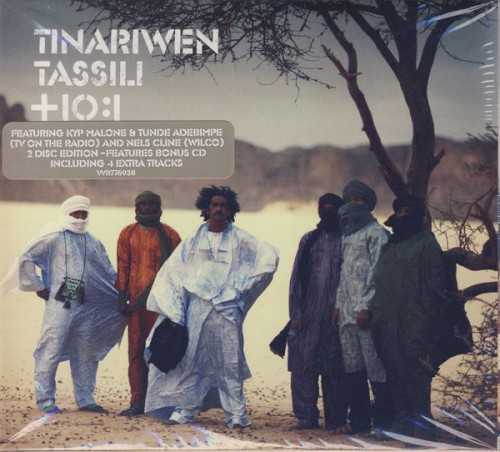 | Album: 5 of 9 Title: Tassili Released: 2011-08-29 Tracks: 16 Duration: 1:08:06 Scroll: Up Down Top Bottom 25% 50% 75% Spotify Allmusic Wikipedia AlbumCover | 1 Imidiwan Ma Tenam (04:41) 2 Assuf D Alwa (04:14) 3 Tenere Taqhim Tossam (04:14) 4 Ya Messinagh (05:30) 5 Walla Illa (04:54) 6 Tameyawt (04:39) 7 Imidiwan Win Sahara (03:45) 8 Tamiditin Tan Ufrawan (03:04) 9 Tilliaden Osamnat (03:26) 10 Djeredjere (04:38) 11 Iswegh Attay (05:50) 12 Takest Tamidaret (04:56) 1 Djegh Ishilan (03:48) 2 El Huria Telitwar (04:31) 3 Kud Edazamin (03:24) 4 Nak Ezzaragh Tinariwen (02:31) |
| Tassili : Allmusic album Review : Tinariwen, the Malian Touraeg group, finally broke through to Western audiences with 2007s Aman Iman and 2009s Imidiwan -- culminating in an appearance at the Glastonbury Festival -- 20 years after their inception. The increased profile did little to alter their "desert blues" with its incantatory droning -- primarily electric -- guitars, claps and organic percussion, and chanted vocals in songs about struggle and independence (some of Tinariwens members were once rebel guerilla fighters). That sound comes out of a nation that exists between the harsh Sahara and the lush African savannah to the south, but it has less in common with other Malian musicians because the band is nomadic, never staying in one place for long. Tassili, named for the region of the Algerian desert they cut the record in, is Tinariwens Anti label debut. It is similar, at least structurally, to its predecessors. Tinariwen play their trademark, labyrinthine music on acoustic guitars this time -- a back to basics development in itself. Conversely, theyve allowed trusted producers Ian Brennan and Jean Paul Romann some liberties in letting Western musicians participate on some cuts. Opener "Imidiwan Ma Tennam" commences much as their music has in the past, with the guitars and lead vocals of Ibrahim Ag Alhabib to lead his bandmates in a snakey weave of handclaps, chants, and secondary guitars to follow his own. A little later, Nels Clines electric guitar almost imperceptibly slithers into the mix, with a stunning but blunted array of effects; they take nothing away from the songs essence. "Ya Messinagh" begins as a single riff blues before handclaps and a second acoustic guitar answer it in what is the closest thing to a Delta blues intro that Tinariwen has recorded. Ag Alhabibs soulful earthy vocals are met at the end of the second verse by the sonorous open tones of brass and reeds by members of the Dirty Dozen Brass Band. Whats amazing is just how seamless their interaction is. On "Walla Illa" and two other cuts, TV on the Radios Tunde Adebimpe and Kyp Malone add vocals and guitars; they add a textual element to other cuts while restraining themselves vocally and instrumentally so as not to intrude. These artists may or may not extend the Touareg groups reach into the West. If so, theyve done so without Tinariwen compromising their sound. These songs are simply Tinariwen doing what they do best: being themselves, albeit more powerfully, not because of the collaborations, but because of the acoustic approach theyve taken here; its sound is dustier, more evocative of the desert vastness they wander. | ||
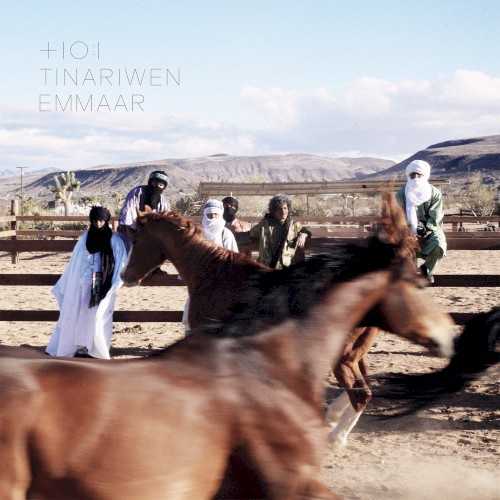 | Album: 6 of 9 Title: Emmaar Released: 2013-02-10 Tracks: 11 Duration: 49:58 Scroll: Up Down Top Bottom 25% 50% 75% Spotify Allmusic AlbumCover | 1 Toumast Tincha (04:22) 2 Chaghaybou (04:56) 3 Arhegh Danagh (04:09) 4 Timadrit In Sahara (04:02) 5 Imidiwan Ahi Sigdim (04:54) 6 Tahalamot (05:13) 7 Sendad Eghlalan (05:04) 8 Imdiwanin Ahi Tifhamam (04:42) 9 Koud Edhaz Emin (04:36) 10 Emajer (03:42) 11 Aghregh Medin (04:18) |
| Emmaar : Allmusic album Review : Challenging circumstances are nothing new to the Kel Tamashek (Tuareg) band Tinariwen. After all, most of their members had been Libyan military-trained rebel fighters engaged in active revolt against the Malian government before the Tamanrasset Accords in 1991. Beginning in 2012, real danger is ever present in northern Mali -- due to the incursion of Islamist militias -- for the Tuareg people and to musicians in particular. So much so, many, including Tinariwen, have fled the country. One of their members, Abdallah Ag Lamida, was even kidnapped, though he has since been released. Tinariwen was forced to exchange one desert -- the Sahara -- for another in Joshua Tree National Park in the United States in order to record Emmaar (without Ag Lamida, who was freed after recording began). Once more produced by Patrick Votan, the sound here retains its "desert blues" heart but is also more expansive -- theres no need for alarm, really. The traditional interlocking guitar interplay involves more drones as lead lines snake underneath them, and there is more reverb in this mix. All of the material was written by leader Ibrahim Ag Alhabib or his bandmembers. Exile, anger, and displacement populate the songs on Emmaar. Multi-instrumentalist Fats Kaplin adds his spiraling fiddle to "Imdiwanin Ahi Tifhamamone" and pedal steel to the militant opener "Toumast Tincha" (that also features guitar from Josh Klinghoffer and a spoken intro by Saul Williams), and the atmospheric dirge "Sendad Eghlalan." Percussionist Amar Chaoui helps out on the stinging "Chaghaybou" and five other tracks, adding a sense of more dynamic urgency to balance the more drone-centric approach. "Emajer," with guest guitarist Matt Sweeney, is a different tack for Tinariwen. Its vibe is more American Southwest (which isnt so strange since this is a nomadic band after all). But Ag Alhabibs lyric and melody are pure African folk song, reflecting loss and longing, as the rolling percussion, voices, and guitars wind around one in multiple melodies underscoring the emotion. The interwoven acoustic guitars on closer "Aghregh Medin (Hassans Song)" offer a staggered minor-key blues. They highlight the disillusionment in the lyric "... I no longer believe in unity/I will only believe in it again if/Those opinions serve a common ideal/That of the people from which they emanate." The different textures and timbres at work on Emmaar reveal Tinariwens evolution; one derived from the need to grow musically, as well as respond to adversity with creativity. | ||
 | Album: 7 of 9 Title: Inside/Outside Joshua Tree Acoustic Sessions Released: 2014 Tracks: 5 Duration: 27:04 Scroll: Up Down Top Bottom 25% 50% 75% Spotify AlbumCover | 1 Adounia Ti Chidjret (Acoustic Version) (07:01) 2 Imidiwan Sadjat Tislim (04:47) 3 Iljaych Tareq (06:10) 4 Inar Tissanam (04:47) 5 Tiwayyen (04:19) |
 | Album: 8 of 9 Title: Live in Paris Released: 2015-11-20 Tracks: 12 Duration: 53:29 Scroll: Up Down Top Bottom 25% 50% 75% Spotify Allmusic AlbumCover | 1 Tinde (07:13) 2 Tamiditin (04:29) 3 Koudedazamin (04:33) 4 Imidiwan Ahi Sigidam (04:38) 5 Tamatant Tiley (03:08) 6 Tinde (03:26) 7 Azawad (03:58) 8 Chaghaybou (04:21) 9 Toumast Tincha (04:21) 10 Tiwayyen (03:40) 11 Emin Assosam (04:49) 12 Tinde Final (04:49) |
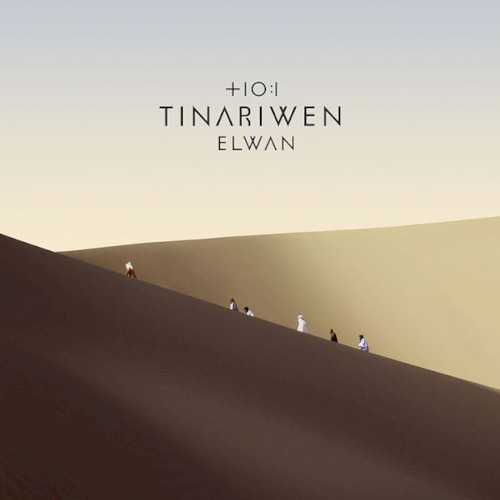 | Album: 9 of 9 Title: Elwan Released: 2017-02-10 Tracks: 13 Duration: 46:14 Scroll: Up Down Top Bottom 25% 50% 75% Spotify TrackSamples Allmusic AlbumCover | 1 Tiwàyyen (03:44) 2 Sastanàqqàm (03:24) 3 Nizzagh Ijbal (03:39) 4 Hayati (03:23) 5 Ittus (03:45) 6 Ténéré Tàqqàl (04:25) 7 Imidiwàn N‐Àkall‐In (03:33) 8 Talyat (04:14) 9 Assàwt (03:39) 10 Arhegh Ad Annàgh (02:47) 11 Nànnuflày (05:03) 12 Intro Flute Fog Edaghàn (01:27) 13 Fog Edaghàn (03:05) |
| Elwan : Allmusic album Review : Decades of cultural displacement, political unrest, and even a kidnapping have somehow failed to dim the spirit of Tinariwen, the long-tenured Saharan desert blues outfit from Northern Mali. Over 30 years into their career and with six albums to their credit, the Tuareg band has maintained a global presence and garnered widespread critical acclaim for its distinctive sound fusing West African assouf traditions with a potent multi-guitar attack. For their seventh album, Elwan, Tinariwen reunited with producer Patrick Votan, who also helmed 2014s dramatic Emmaar. Just prior to Emmaar, the band was exiled from Mali, fleeing from the militant Islamist regime Ansar Dine, who denounced popular music as "Satans music." With their homeland still in conflict, this album marks the second time the embattled musicians were unable to record on native soil. Captured in France, Morocco, and California, Elwan is a work of subtle power, relying less on the atmospheric grace of its predecessors and focusing on the distilled, fine-tuned engine of Tinariwens percussive core. Overall, the albums production is more immediate and, with its tasteful contingent of rock-oriented guests like Kurt Vile, Mark Lanegan, Alain Johannes, and Matt Sweeney, the arrangements still remain spare and effective. On the slowly unfurling "Ténéré Tàqqàl," gently snaking riffs belie the tension of the lyrics, which make reference to uprisings, both human and animal. On "Imidiwàn N-Àkall-In," a track full of quietly roiling tension, bandleader Ibrahim Ag Alhabib sings "My own people have abandoned their ancestral ways, all thats left is a groaning land full of old people and children." While there is certainly bitterness throughout Elwans 13 tracks, there is hope, love, and motivation, too. On the dreamy "Nànnuflày," a spray of smoothly interlocking guitar riffs build as Alhabib and the group deliver a call-and-response to which guest vocalist Lanegan replies "No sleepwalking, dont keep me apart, Im through sleepwalking, God be in my heart." Exiles, explorers, and seekers of inner truth, Tinariwen once again deliver a vital and engaging album. | ||